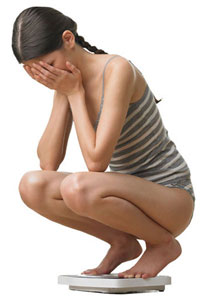 I’m sure nearly everyone trying to manage their weight feels guilty when they overeat. There’s a reason they call it “stuffed.” It doesn’t feel good being bloated, especially after some time of eating reasonable portions and re-training the stomach to understand what a comfortable, full feels like.
I’m sure nearly everyone trying to manage their weight feels guilty when they overeat. There’s a reason they call it “stuffed.” It doesn’t feel good being bloated, especially after some time of eating reasonable portions and re-training the stomach to understand what a comfortable, full feels like.
My mom had a magnet on our refrigerator that said “a moment on the lips, a lifetime on the hips!” Of course, there was a picture of a pig eating a piece of coconut cream pie on it. (Lest you think I come from a family of skinny-minnies, quite the contrary. Most adult women in my family weigh in the 200-300 pound range).
As a nutrition expert who works with emotional eating, eating disorders, and weight management I honestly think that magnet should say “a moment on the lips, a lifetime on the mind.” While it doesn’t rhyme as well, I do think it is the true damage of overeating. The guilt people can carry can overwhelmingly sabotage any progress toward mindful, healthy eating.
It doesn’t have to be that way, though. I’ve got a few tips that will help you better deal with it:
- Don’t feel guilty about wanting to eat. Food is necessary for your survival, and it was intended to be an enjoyable experience, not a guilt ridden one. If you think about food often, don’t beat yourself up. With the abundance of cheap food widely available it is no wonder food is on the brain. Remind yourself that guilt can reverse your positive progress.
- Expect the “overeating relapse.” Nobody is perfect – good thing or life would be boring! Don’t encourage a “relapse” every time you pass the fast food joint or the junk food aisle. But trust me, you will have a time when your life feels “out of sorts” or particularly stressful. You’ll probably overeat. The best thing you can do is learn from it. If the food didn’t cause the problem, it won’t solve it either. What did you really need? To feel good? Maybe next time, a conversation or a hug will do the trick without the extreme guilt that follows overeating.
- Don’t let “triggers” control you. Triggers are things in your physical or emotional environment that make you want to overeat. They can be particular foods, feelings, or events. Common triggers include parties revolving around food, feeling depressed, bored or frustrated, loneliness, or having a bad day. How will you positively deal with triggers when they come your way? I advise my clients to avoid “food triggers” for a few weeks; eventually, the temptation fades. For some clients, the opposite works. I tell them to eat their “trigger” every day. Sooner or later, they get sick of it once the allure is gone.
- Focus on the positive. Rather than making statements such as, “I’m useless at…” or “I’ll never be able to…” change your focus to something more encouraging. What have you done that is working for you? What is positive? If you hit a weight loss plateau, how much have you lost in total? How many exercise calories did you burn this week? How many nights did you get enough sleep?
